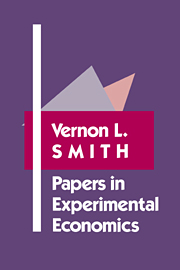Book contents
- Frontmatter
- Contents
- Preface
- Acknowledgments
- Part I The Formative Years
- Part II Institutions and Market Performance
- Part III Public Goods
- Introduction
- 20 The Principle of Unanimity and Voluntary Consent in Social Choice
- 21 Incentive Compatible Experimental Processes for the Provision of Public Goods
- 22 An Experimental Comparison of Three Public Good Decision Mechanisms
- 23 Experiments with a Decentralized Mechanism for Public Good Decisions
- 24 Experimental Tests of an Allocation Mechanism for Private, Public or Externality Goods
- Part IV Auctions and Institutional Design
- PART V Industrial Organization
- Part VI Perspectives on Economics
23 - Experiments with a Decentralized Mechanism for Public Good Decisions
Published online by Cambridge University Press: 06 July 2010
- Frontmatter
- Contents
- Preface
- Acknowledgments
- Part I The Formative Years
- Part II Institutions and Market Performance
- Part III Public Goods
- Introduction
- 20 The Principle of Unanimity and Voluntary Consent in Social Choice
- 21 Incentive Compatible Experimental Processes for the Provision of Public Goods
- 22 An Experimental Comparison of Three Public Good Decision Mechanisms
- 23 Experiments with a Decentralized Mechanism for Public Good Decisions
- 24 Experimental Tests of an Allocation Mechanism for Private, Public or Externality Goods
- Part IV Auctions and Institutional Design
- PART V Industrial Organization
- Part VI Perspectives on Economics
Summary
Public goods theory, as articulated by Paul Samuelson (1954), Mancur Olson, and many others, has maintained that the distinguishing characteristic of nonexcludability, inherent in public goods, implies the impossibility of optimal public good provision by decentralized (voluntary) mechanisms. Since no one can be excluded from the benefits of the public good, each has an incentive to “free ride”; that is, contribute less than his marginal valuation to the cost of the public good. Consequently, public goods theory has suggested two hypotheses.
HF: The free rider hypothesis.
HiThe impossibility of decentralized public good provision.
Traditional public goods theory has not viewed HF and Hf as independent hypotheses. The assumption of free rider behavior has led to the conclusion that all decentralized mechanisms would lead to the nonprovision of public goods (for example, Earl Brubaker refers to this as a consequence of the strong free rider hypothesis), or at least to suboptimal quantities of public goods.
Precursory and recent contributions by William Vickrey, Edward Clarke (1968, 1971), Theodore Groves (1969, 1973), and Groves and John Ledyard, while accepting the logic of free riding behavior, have sought solutions to the problem in the form of cost-sharing mechanisms that would give each individual an incentive to contribute to the cost of a public good an amount equal to his marginal private valuation of the public good.
- Type
- Chapter
- Information
- Papers in Experimental Economics , pp. 474 - 489Publisher: Cambridge University PressPrint publication year: 1991
- 16
- Cited by



